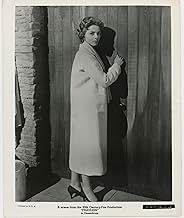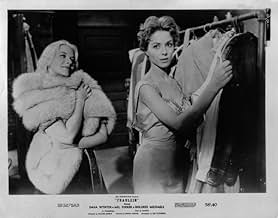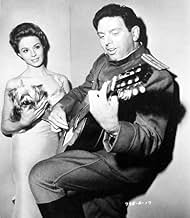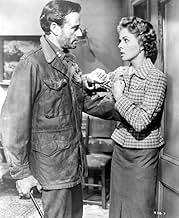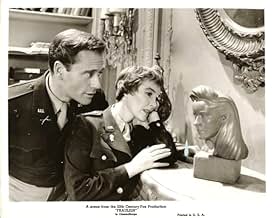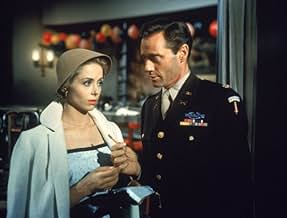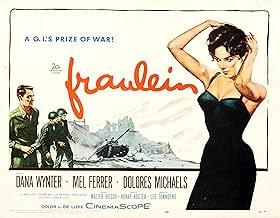A Nazi's fiancée helps an escaped U.S. soldier, then meets him in postwar Berlin.A Nazi's fiancée helps an escaped U.S. soldier, then meets him in postwar Berlin.A Nazi's fiancée helps an escaped U.S. soldier, then meets him in postwar Berlin.
Margaret Hayes
- Lt. Berdie Dubbin
- (as Maggie Hayes)
Dorothy Arnold
- Woman with Hugo
- (uncredited)
John Banner
- Ulick, German Health Dept.
- (uncredited)
George Blagoi
- Club Patron
- (uncredited)
Edith Clair
- Bit Role
- (uncredited)
Peter Coe
- Russian Soldier
- (uncredited)
Bud Cokes
- Club Patron
- (uncredited)
- Director
- Writers
- All cast & crew
- Production, box office & more at IMDbPro
Featured reviews
Some of the great movies of all time such as "Gone With the Wind", "Doctor Zhivago" and "War and Peace" have set their characters adrift against a backdrop of momentous historical events.
"Fräulein" is certainly set against awesome historical events, but the filmmakers seem to have tackled the drama with one hand tied behind their backs - and the old Hollywood Production Code probably did much of the tying.
The film is set in Germany at the end of WW2. Erika Angermann (Dana Wynter), a young German woman encounters an escaping American prisoner, Major Foster MacLain (Mel Ferrer) who plays a significant role in her life. She flees from the Russian zone to the American Zone and undergoes many of the things women in Germany experienced at the end of the war. The sense of degradation and humiliation visited upon the defeated nation is touched on in a number of sequences.
However Erika's episode with the Red Army stretches credulity. Although upwards of 2,000,000 German women were raped by the avenging Red Army, Erika manages to stay chaste, miraculously slipping through their fingers, despite being so eye-catching that in reality she would probably have been the object of a full-scale pincer movement.
The film was based on a novel that had a harder edge, but of course a Hollywood movie in 1956 had to tone things down. Even with those limitations, more could have been done to capture a sense of the great upheaval and dislocation of millions of people that took place. Despite some footage shot on location, the direction and photography for the most part is pedestrian.
A few sequences do resonate: Erika briefly seen as one of the Trümmerfrau or rubble woman; Lt. Hugo Von Metzler (Helmut Dantine), the once proud officer reduced to making lampshades; the cruel way in which Erika is set up as a prostitute by people she trusted.
Dana Wynter (who was born in Germany) was an actress who made an impression on me growing up in the 1950's ("Something of Value", "D-Day the Sixth of June"); she seemed the epitome of beauty and elegance. Maybe Hollywood didn't know what to do with her; surely she should have become a bigger star.
"Fräulein" is interesting for the time in which it was set and its beautiful star. Unfortunately it settled for being a romance rather than something more telling.
"Fräulein" is certainly set against awesome historical events, but the filmmakers seem to have tackled the drama with one hand tied behind their backs - and the old Hollywood Production Code probably did much of the tying.
The film is set in Germany at the end of WW2. Erika Angermann (Dana Wynter), a young German woman encounters an escaping American prisoner, Major Foster MacLain (Mel Ferrer) who plays a significant role in her life. She flees from the Russian zone to the American Zone and undergoes many of the things women in Germany experienced at the end of the war. The sense of degradation and humiliation visited upon the defeated nation is touched on in a number of sequences.
However Erika's episode with the Red Army stretches credulity. Although upwards of 2,000,000 German women were raped by the avenging Red Army, Erika manages to stay chaste, miraculously slipping through their fingers, despite being so eye-catching that in reality she would probably have been the object of a full-scale pincer movement.
The film was based on a novel that had a harder edge, but of course a Hollywood movie in 1956 had to tone things down. Even with those limitations, more could have been done to capture a sense of the great upheaval and dislocation of millions of people that took place. Despite some footage shot on location, the direction and photography for the most part is pedestrian.
A few sequences do resonate: Erika briefly seen as one of the Trümmerfrau or rubble woman; Lt. Hugo Von Metzler (Helmut Dantine), the once proud officer reduced to making lampshades; the cruel way in which Erika is set up as a prostitute by people she trusted.
Dana Wynter (who was born in Germany) was an actress who made an impression on me growing up in the 1950's ("Something of Value", "D-Day the Sixth of June"); she seemed the epitome of beauty and elegance. Maybe Hollywood didn't know what to do with her; surely she should have become a bigger star.
"Fräulein" is interesting for the time in which it was set and its beautiful star. Unfortunately it settled for being a romance rather than something more telling.
This is Dana Wynter's film, there is no question about it. It is her story as the daughter of a German professor in Cologne who gets killed in one of the last air raids of the war, whereafter she is lost and has to survive by any means, possible or impossible. She ends up in Berlin where she has to lead an existence like one of the ruins, until chance moves in. It's a great story, and although Mel Ferrer is the male lead, he is actually only a supporting actor to Dana Wynter, who makes her smile. There are many fine sequences, but one of the best is the appearance of Theodore Bikel as a Russian officer saving her from harassment by his soldiers and actually saving her life, while he gets drunk out of infatuation with her, wishing to marry her and take her as a bride to Bucharest and giving a hell of a party, before he vanishes out of the film to further unknown adventures in Bucharest. Another poignant scene is her encounter with her crippled former fiancé, who is too well aware of that the world of their love its gone forever and acts accordingly. Throughout the film Dana Wynter keeps her poise, she never smiles, she is dead serious too well aware of the war that has ruined her world and possibilities, and yet her personality brings some magic that makes people help her on - the story of her room mate is of vital importance and should be followed carefully, from the moment she steals her vodka and to the final crisis. This is a film to love and enjoy, and there is no propaganda in it. Berlin is caught in the realism of its ruins, like the whole film is genuinely realistic. Henry Koster was thoroughly reliable throughout his career and made many classics, although he never was generally put in the first rank.
would like to buy this in DVD or VHS any inf. on this. when will this be out on the things i mentioned. i enjoyed this movie. this is one of the better movies that was made. so if you can help me to purchase this movie i would appreciate it very much. thank you for letting me make a comment on this movie. i cannot say enough about these old movies they should have more of them on DVD or VHS. i do not know why they are not putting all the old movies on DVD or VHS you would or could make a lot of money. because there are a lot of old folks that would buy these movies. when i was a young man i have seen a lot of movies if they were on tape i would not hesitate to buy them. i was also looking for the tarzan movies with johnny weissmuller. all of them not just 6 they have out now. thank you again
Dana Wynter had presence ( not all actors do ) and I feel she was vastly underrated. Here she is given the lead in a film that attempts to reconstruct Germany at the time of its defeat, and the advance of the Soviets into Berlin. With the brutal death of her father in Cologne Erica goes to Berlin, and there inadvertently enters a house of prostitution. Interestingly told it is full of stereotypes ( less for the Germans than the Soviets ) and this in many ways detracts from the films serious approach. Perhaps Koster was not the right director, but the scenario borders on the sensationalist aspect of the Soviets, and that in the main was their need to rape any woman on sight, including of course Erica. Mel Ferrer ( not the best actor ) is the G. I. who comes like a shining knight to save her, and here end of spoilers. Filmed well in Cinemascope there are good moments, but it is Dana Wynter's film and in my opinion she carries it more or less single handed to a higher level. Another ' lost ' film that I accidentally saw on television. Worth seeing but on my part with deep reservations about authenticity.
I have seen more authentic films about post-war Germany but this tale is pleasant enough viewing. There are more than a few instances of clumsy direction and poor acting which are somewhat disengaging, but the film does seem to improve as it goes along. For some reason the initial scenes are very brief and perfunctory. Further into the film there are some quite dramatic scenes with the heroine escaping various fates. Dana Wynter is very beautiful eye candy, but she is saddled with a poorly written character and radiates sulkiness for most of the film, before an improbable U-turn. Mel Ferrer is a likeable and graceful hero (cute butt, Mel!) but is scarcely portrayed with any depth. When it comes to charm, the piano-playing friend steals the scene. I enjoyed the "lucky break" the heroine experiences at the end of the film, which leaves you with a warm feeling. So overall, a positive rating, but I think the guy who wrote the novel (by all accounts a more realistic version) has probably never stopped complaining about what Hollywood did to his opus..
Did you know
- TriviaMacLain as a captured POW has "KG" written on his back. This is a German acronym for the word kriegsgefangenen, meaning war prisoner.
- GoofsTwo tanks not Russian T34's.
- Quotes
Lori the piano player: Prostitute? I don't believe you. She has a job at the Club Florida. I work there too. Now, go on. Get out.
Ulick, German Health Dept.: I didn't come here to make any fuss. As long as she stays here and doesn't leave town, she won't have any difficulties. Just tell her to come by once a month and report to the Health Department.
- ConnectionsFeatured in Hollywood Screen Tests: Take 2 (1999)
- SoundtracksWhen Johnny Comes Marching Home
(uncredited)
Traditional
Played when Erika is on the barge
Details
- Release date
- Country of origin
- Languages
- Also known as
- Fraulein
- Filming locations
- North Rhine-Westphalia, Germany(River cruise scene)
- Production company
- See more company credits at IMDbPro
- Runtime
- 1h 35m(95 min)
- Color
- Aspect ratio
- 2.35 : 1
Contribute to this page
Suggest an edit or add missing content

